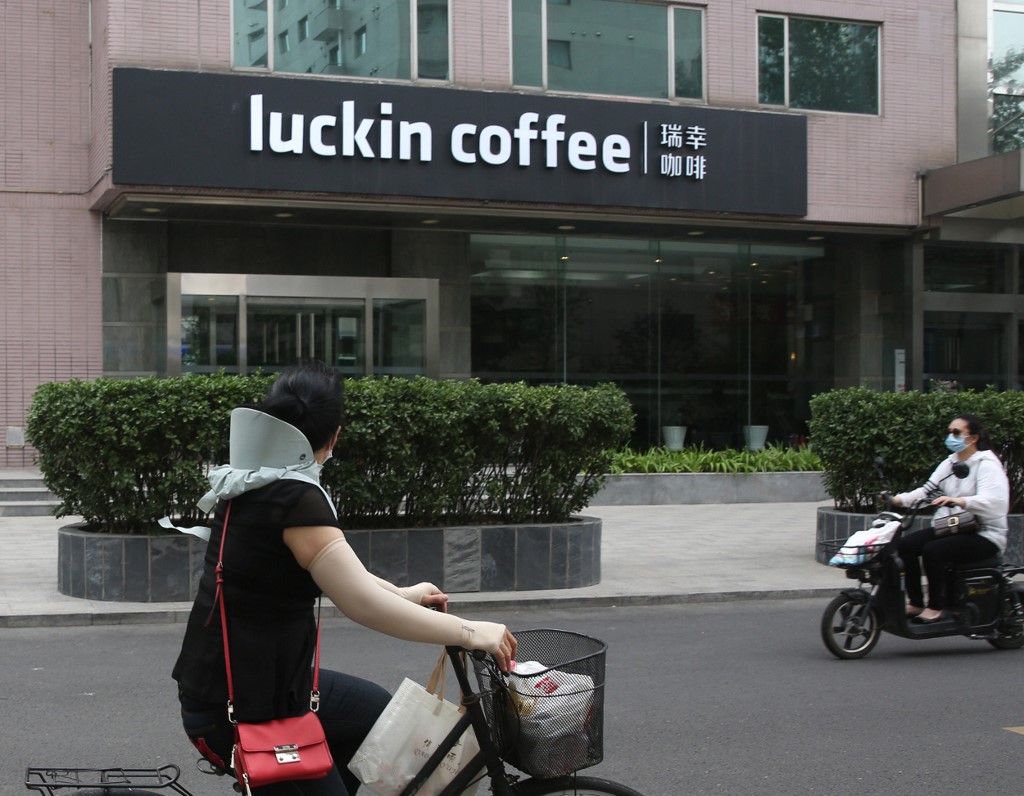(ATF) China is speeding up its “zero tolerance” policy on financial crime after the Luckin Coffee scandal threatened US markets’ trust in Chinese companies – by launching a class-action lawsuit system for securities investors and amending the regulation on public company disclosure.
China’s Supreme Court released the provisions on Friday for representative securities litigation, marking the launch of a class-action lawsuit system for securities investors in China.
The system will be a “convenient and low-cost claim channel” for small and medium volume investors and form a strong deterrent to financial criminals, the Supreme Court said in a statement.
Jinhong Jiao, the CSRC’s chief counsel, said at the Supreme Court’s press conference that small and medium volume investors often give up their rights for claims because they are highly dispersed and their claim amount is usually small.
But in a market with 167 million investors, small and medium volume investors account for 95% of the people putting their money on the line.
Jiao said the launch of a class-action lawsuit system will help ensure business people meet their civil obligations as well as criminal and administrative obligations, because it will increase the risk and cost of committing financial crimes.
Luckin Coffee to face penalties
The news comes as national regulators say they plan to penalise Luckin Coffee after their inquiries confirmed the coffee chain faked over US$300 million in sales.
The Ministry of Finance (MOF) has finished a three-month investigation into two Luckin subsidiaries in China, its affiliates, and 23 financial institutions relating to the scandal, the ministry said in a statement on Friday.
It confirmed that Luckin is in violation of China’s Accounting Law by faking sales of 2.25 billion yuan ($322 million) and revenue of 2.12 billion yuan ($304 million) from April to the end of 2019.
The MOF said it will take punitive action on Luckin’s operating entity in China.
In a separate statement, the China Securities Regulatory Commission (CSRC) said on Friday that in addition to Luckin’s accounting fraud the Ministry of Finance and State Administration for Market Regulation (SAMR) have found Luckin and related third-party companies had violated China’s Accounting Law and Anti-Unfair Competition Law by faking transactions, sales, costs and fees on a massive scale, the CSRC said in a statement last Friday.
Regulators also found the car rental company Zuche.com and the digital marketing service provider QWOM Digital Technology violated China’s Securities Law in regard to information disclosure issues. Both Zuche.com and QWOM are Luckin’s affiliates that trade over the counter.
Regulators will impose a penalty on Luckin’s operating entity in China, plus several third-party companies that helped fabricate Luckin’s sales and publicity, as well as the two affiliates, the CSRC said.
The Luckin Coffee scandal became the most high-profile case of Chinese corporate fraud to date when it was found in April to have faked $300 million worth of sales. Shares of Luckin were delisted from the Nasdaq in June after the fraud wiped about $5.5 billion off its market value.
Tip of an iceberg
The Luckin Coffee accounting fraud is regarded as just the tip of an iceberg in an under-regulated market.
In a statement on July 12, the Financial Stability and Development Committee conceded that shortcomings in the design of China’s current financial system and the low cost of committing financial crime had led to several accounting scandals recently.
# Kangmei Pharmaceutical, once an investor-coveted pharma company with over 100 billion yuan ($14 billion) in market cap, was found to have faked sales of 9 billion yuan ($1.3 billion) in 2016, 10 billion yuan ($1.4 billion) in 2017, and 1.6 billion yuan ($229 million) in 2018.
# Kangde Xin Composite Material Group, a high polymer material manufacturer also listed on the A-share market, was convicted of faking profits totalling 11.92 billion yuan ($1.7 billion) in the four years from 2015 to 2018.
# CDWI, a Shenzhen-listed manufacturer of diving gear, saw its stock price rise 10 times after touting moves into the hi-tech industry to acquire companies that were later found to have zero profit or losses on their income statements. The Shenzhen Stock Exchange has initiated several probes into its dubious transactions.
To send a clear signal of “zero tolerance” to the market, China enacted a new Securities Law in March and increased the penalty cap on listed-company executives from 600,000 yuan ($85,900) to 10 million yuan ($1.4 million).
Under the framework of the new Securities Law, China is also rolling out a registration-based IPO system that makes it easier for companies to go public but is stricter on information disclosure.
In a statement last Friday, the CSRC said it had handed over 24 securities crime cases involving disclosure violations to the police since 2019, and just recently, 10 more cases involving accounting fraud, disclosure violations, and embezzlement.
Information disclosure changes
To implement the information disclosure framework set by China’s revised Securities Law, legislators are amending the regulation on information disclosure for listed companies for the first time in 13 years.
According to a statement by the Securities Regulatory Commission (CSRC) about a week ago, three main changes will be made to the Administrative Measures on Information Disclosure by Listed Companies (Administrative Measures), which was first launched in 2007.
First, the regulation requires listed companies to make information more transparent and easier to understand in addition to being true, accurate, complete, and on time.
It also calls for listed companies to voluntarily disclose information pertaining to the valuation and investment decisions by investors besides their legal obligations. “Companies must not mislead investors or selectively disclose information. They must not manipulate the market, engage in insider trading or other illegal activities through voluntary disclosure,” the statement said.
Second, more types of incidents have been added to “major incidents” that affect stock prices and require disclosure, such as significant changes to similar businesses conducted by the company’s actual controlling party and other enterprises controlled by such a party, dividend paying and capital increase plans, as well as significant changes in the company’s shareholding structure.
A rule that specifies bond-related major incident disclosure has also been added. Listed companies that also issue company bonds are required to report on major production or operational changes, bond rating changes, major asset sale or transfer, and failure to repay debts, among others.
Third, the regulation emphasises the roles of a board of directors, the supervisory board, and high-level management executives to ensure the trueness, accuracy and completeness in terms of information disclosed. Periodic reports must be reviewed and approved by the board of directors, it said.
Penalty notices
“China’s various levels of listed-company information disclosure laws and regulations address issues in three main aspects – the scope of ‘what’ should be disclosed, the standards for ‘how’ it should be disclosed, and ‘who’ should be responsible for the disclosure. These issues cannot be thoroughly addressed through one round of legislation, and hence the amendments are made,” said Zhibin Wang, a lawyer who specialises in legal services for investors and a partner of Bright & Young Law Firm.
For example, previously it was not clear whether periodic reports must be reviewed by the board of directors, and there were cases where directors tried to evade responsibility saying that reports did not go through a board review, Wang said.
“By specifying the directors’ responsibility to review the periodic reports, the regulation helps to incentivise them and eradicate fraudulent disclosure,” he said.
Information disclosure issues such as fraudulent statements, misleading statements, selective disclosure and delayed disclosure have all been prevalent in China.
The CSRC and its local subordinates gave out 38 “penalty tickets” to listed-companies for information disclosure issues from the beginning of this year to date. Up to the middle of July, 129 secretaries of boards responsible for information disclosure, had received penalty decisions from the CSRC or stock exchanges.
One common issue is that listed companies tend to disclose good rather than bad news and often fail to provide risk alerts. They now get probes by regulators when their stock prices fluctuate abnormally.
For example, according to a case study by Shanghai-based Huiye Law Firm, one firm started to list the production and sales figures of “new energy buses” as a separate item in its monthly reports starting from October 2015. Its stock price soared by 10% daily on 8 out of 10 consecutive trading days after the disclosure. However, the company intentionally left out the item in a later report, and it turned out that no new energy bus was produced in that month. The stock exchange deemed the practice inappropriate because a new energy bus was a main contributor to the company’s 9-fold net income increase in 2015.
‘No clarity on what to disclose’
But even the amended Administrative Measures do not provide clarity on what kind of information should fall under “voluntary disclosure”.
“It is difficult to judge what kind of information pertains to valuation and investment decisions. The judgement would be subjective and up to each secretary’s interpretation,” Baolian Zhang, an analyst from National Business Daily, said in an article.
To avoid risks, many secretaries choose not to provide voluntary disclosure or play it safe by only releasing information on social responsibilities, long-term strategies, company mission, and so on.
Articles related to information disclosure are dispersed in various laws, regulations and guidelines such as the Company Law and Securities Law legislated by the Standing Committee of the National People’s Congress, Provisional Regulations on the Administration of Share Issuance and Trading issued by the State Council, regulations by the CSRC including the Administrative Measures, as well as self-discipline guidelines issued by the Shanghai and Shenzhen stock exchanges.
Even though these laws should prevail, there are over 300 statements on rules with often inconsistent information that can be perplexing to follow.
Zhang called for policy makers to consolidate the articles relating to voluntary disclosure in one regulation. She also suggests that a feedback and incentive system be set up for voluntary disclosure by board secretaries.
Seven measures
The launch of a class-action lawsuit system and amendments to the information disclosure regulation are among the seven “zero tolerance” measures aimed at enhancing the enforcement of laws and regulations in China’s securities sector.
According to a statement by the Financial Stability and Development Committee (FSDC) released after its meeting on July 11, other “zero tolerance” measures include:
# speeding up case investigation and imposing stricter penalties,
# continuing reform of the delisting system,
# amending the Criminal Law to further prevent illegal conduct,
# and strengthening the law enforcement system, among others.
‘Penalties could be tougher’
These moves to toughen the regulatory system have been welcomed by analysts but some noted that new penalties under the revised securities law were still lenient considering the scale of investor losses.
“It’s good to see that Chinese regulators are taking steps to strengthen oversight over listed companies’ corporate governance practices after Luckin Coffee’s scandal, and some bond defaults in recent years associated with frauds, including KDX and Kangmei,” said Ying Wang, Fitch Ratings head of APAC Energy & Utilities and China Research Initiatives.
“My view is that Chinese listed companies’ information disclosure is not significantly weaker than that elsewhere. In fact, mainland A-share listing requires more stringent disclosure standards than some other stock exchanges such as the HKEX,” Ying Wang said. “However, the punishment for companies committing frauds is light in China, which has allowed many corporate owners and executives to escape prison time and heavy financial penalties.
“The new Securities Law, which came into effect this past March, will impose greater penalties than previously (when the cap for penalty was only 600,000 yuan), but we have not yet seen penalties which are large enough to cover the losses borne by investors yet. Hence, it’s still early to tell whether there will be any fundamental change in this aspect, but even baby steps are a positive development.”
























